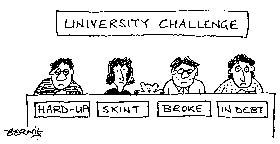I enjoy BBC Radio 4’s Any Questions and feel privileged when I am asked to join Jonathan Dimbleby’s panel.
I enjoy BBC Radio 4’s Any Questions and feel privileged when I am asked to join Jonathan Dimbleby’s panel. But like (I suspect) any other panellist when the On Air light goes on, I’m conscious of a temptation to play to the gallery and adjust my opinions and the force with which I express them to maximise either cheers or boos — or at least elicit a strong reaction. The reaction one most fears is the bored or baffled silence that may follow too nuanced or uncertain an answer.
This is not a modern tendency, or the peculiar influence of Any Questions. It’s the way an open democracy pushes those who seek public approval. ‘Have I said something foolish?’ was the reported reaction of Phocion to his friend, Diogenes Laertius, after the crowd applauded a point in his speech, 2,161 years ago.
Joining Mr Dimbleby’s panel for the first Any Questions of 2011 I had guessed that control orders would come up: we are awaiting an announcement of the new government’s reconsideration of what is effectively house arrest, without charge, for some suspected terrorists, and by the time you read this we may know the shape of these proposals. When Dimbleby asked my view I replied honestly that I found the issue difficult, so, trusting Nick Clegg’s instincts in such matters (and slightly mistrusting the reflexive deference many Conservative politicians accord anyone in a uniform), I was content to be guided by the Deputy Prime Minister’s conclusions.
Silence from the audience.
Jonathan Dimbleby pressed harder. What if there was evidence that unless a particular individual was constrained there was ‘a risk he might join in a terrorist attack’? Would my instinct be to compromise his liberties?
I hesitated.









Comments
Join the debate for just £1 a month
Be part of the conversation with other Spectator readers by getting your first three months for £3.
UNLOCK ACCESS Just £1 a monthAlready a subscriber? Log in